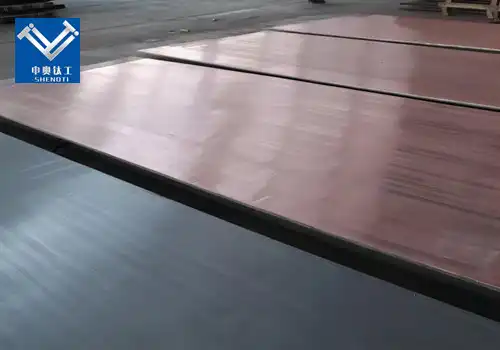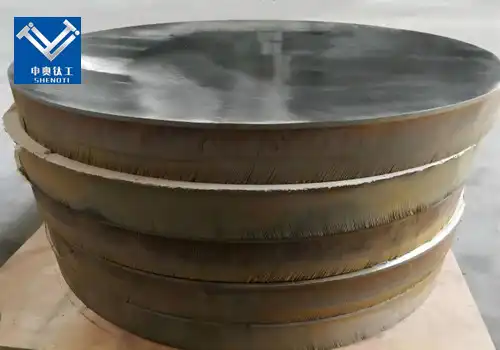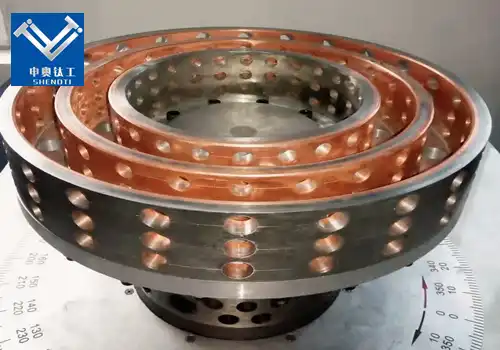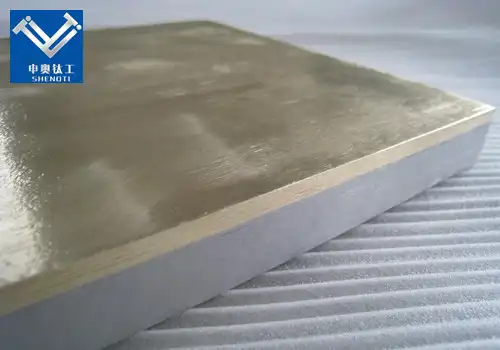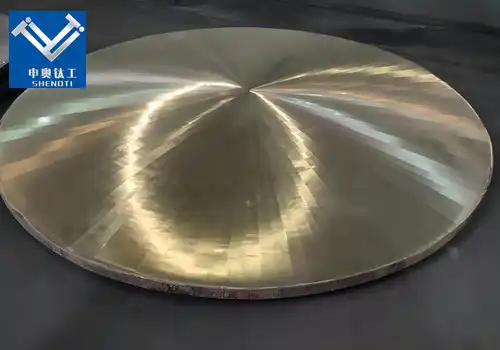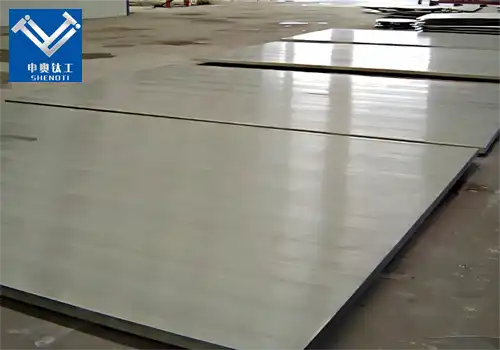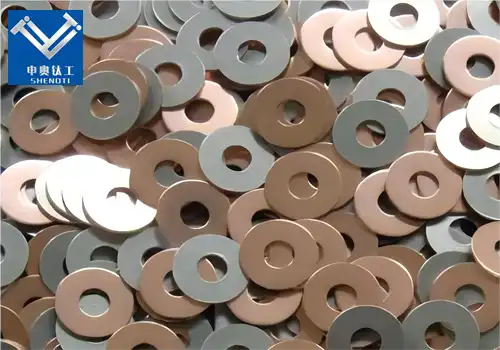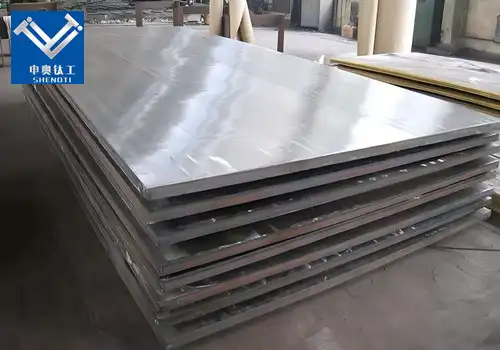
Industrial Applications of Titanium Clad Carbon Steel Plate
2025-07-08 16:06:22
What is a Titanium Clad Carbon Steel Plate?
Definition and Composition
A titanium clad carbon steel plate is a bimetallic composite material that consists of a corrosion-resistant titanium layer bonded to a strong, cost-efficient carbon steel base. The cladding process ensures a metallurgical bond between the two dissimilar metals, combining their best properties into a single material.
Titanium Layer (Cladding): Provides excellent corrosion resistance, particularly against acids, chlorides, and seawater.
Carbon Steel Substrate: Offers structural strength, toughness, and cost efficiency.
Manufacturing Technologies
There are several methods used to manufacture titanium clad carbon steel plates:
Explosive Bonding: A high-energy process that uses controlled explosive force to bond titanium to carbon steel.
Roll Bonding: Involves heat and pressure to bond the two layers in a rolling mill.
Hot Pressing: A combination of high temperature and mechanical pressure in a vacuum or inert gas environment.
Each method ensures a strong metallurgical bond, and the choice of technique often depends on the plate's intended application, size, and thickness.
Why Choose Titanium Clad Carbon Steel Plate?
Superior Corrosion Resistance
The titanium surface resists corrosion from:
Hydrochloric acid
Sulfuric acid
Nitric acid
Chlorine gas
Seawater
This makes the titanium clad carbon steel plate ideal for chemical reactors, heat exchangers, and desalination systems.
Mechanical Strength and Structural Integrity
Thanks to the carbon steel base, the composite plate retains high mechanical strength, making it suitable for pressure vessels, columns, and storage tanks under extreme mechanical and thermal stress.
Cost-Effective Solution
Pure titanium equipment is expensive due to the high cost of the raw material. However, using a titanium clad carbon steel plate dramatically reduces cost while maintaining performance, as only the outer layer is titanium.
Lightweight and Durable
Despite being lighter than many conventional corrosion-resistant alloys, titanium cladding offers long-lasting service life, reducing maintenance and downtime costs.
Industrial Applications of Titanium Clad Carbon Steel Plate
1. Chemical Processing Industry
Chemical production facilities require materials that resist aggressive media such as acids and chlorides. Titanium clad carbon steel plates are extensively used in:
Pressure vessels
Heat exchangers
Reactors
Absorbers
Their ability to resist pitting and stress corrosion cracking enhances operational safety and longevity.
2. Marine and Offshore Engineering
Seawater and marine environments accelerate corrosion. Using titanium clad carbon steel plates in:
Desalination plants
Offshore oil platforms
Seawater cooling systems
ensures corrosion resistance and mechanical strength in high-pressure environments.
3. Power Generation Industry
In nuclear and thermal power plants, titanium clad carbon steel plates are used in:
Condensers
Deaerators
Feedwater heaters
They help resist corrosion caused by demineralized water and steam, ensuring reliability and efficiency.
4. Petrochemical and Refinery Sectors
Petrochemical plants demand high-performance materials to handle mixed hydrocarbons, acids, and high pressures. Titanium cladding provides the necessary protection against corrosion and fouling.
5. Pharmaceutical and Food Industries
Due to titanium’s excellent biocompatibility and non-toxic nature, titanium clad carbon steel plates are used in:
Sterilization equipment
Mixing vessels
Fermenters
where purity and hygiene are paramount.
Technical Specifications and Standards
Common Grades and Thicknesses
Titanium Grades: Gr1, Gr2 (commercially pure titanium), and Gr7 (with palladium for extra corrosion resistance)
Carbon Steel Grades: Q235, Q345R, SA516 Gr70, etc.
Cladding Thickness: Typically ranges from 0.5mm to 5mm
Plate Thickness: Can range from 6mm to 100mm depending on the application
Standards and Certifications
ASTM B898: Specification for titanium clad steel plates
ASME Code Section VIII: For pressure vessels
GB/T 8547: Chinese national standard for titanium-steel clad plates
Titanium clad carbon steel plate clearly stands out when balancing performance, durability, and cost.
Key Considerations When Choosing Titanium Clad Carbon Steel Plate
1. Corrosive Medium Type
Understand the chemical composition of the working environment to ensure the selected titanium grade provides adequate protection.
2. Temperature and Pressure
Determine operational parameters to ensure the carbon steel substrate can handle internal loads, while the titanium layer resists surface degradation.
3. Welding and Fabrication
Clad plates require specialized welding techniques, typically using titanium filler wire and backing gas protection to maintain corrosion resistance at joints.
4. Supplier Expertise
Work with experienced manufacturers who offer quality assurance, custom solutions, and technical support for cladding and fabrication.
Frequently Asked Questions
Q1: What is the service life of a titanium clad carbon steel plate?
With proper design and application, these plates can last over 20 years, even in aggressive chemical or marine environments.
Q2: Can titanium clad carbon steel plates be welded?
Yes, but welding must be done carefully using appropriate filler materials and shielding gases to prevent oxidation and delamination at the interface.
Q3: Are these plates suitable for pressure vessels?
Absolutely. They are widely used in ASME-certified pressure vessels thanks to their strength and corrosion resistance.
Q4: How does titanium cladding compare to coatings or linings?
Unlike coatings or linings that can peel or wear off, titanium cladding is permanently bonded to the steel, ensuring lasting protection even under thermal or mechanical stress.
Why Choose Us as Your Titanium Clad Carbon Steel Plate Supplier
We are a trusted manufacturer and global exporter of premium titanium clad carbon steel plates. With years of experience in explosion bonding and metallurgical engineering, we provide:
Customized solutions: Sizes, grades, and configurations to fit your project
Strict quality control: Full testing per ASTM and ASME standards
Global delivery: Serving customers across Asia, Europe, the Middle East, and North America
Technical support: From material selection to installation guidance
Contact Us
For inquiries, custom orders, or technical consultations on titanium clad carbon steel plate, feel free to reach out:
Baoji City ShenAo Metal Materials Co., Ltd.
Email: zh@baojiti.com.cn
Website: www.shenaocladplate.com
YOU MAY LIKE











